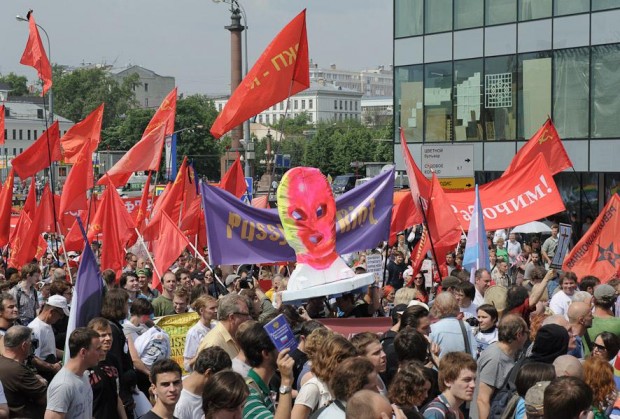You have no items in your cart. Want to get some nice things?
Go shopping
In last week’s press release, the two recently released members of Pussy Riot, Nadezhda Tolokonnikova and Maria Alyokhina, stated that their group’s “brand” had outgrown its origins as a Russian protest punk band. It is now, they said, a global project. To quote Tolokonnikova: “The question on Pussy Riot should not be addressed just to us, as this project now lives separately from us in many different forms across the world.” By now, the statement amounts to a truism: one need only look at their now-iconic brightly coloured balaclavas and tights – worn by the group during February 2012’s “Punk Prayer” – and their support from global luminaries, which amounted to a comprehensive A-Z (Assange to Žižek). The band’s keen awareness of the power of international symbols was particularly apparent in the choice of T-shirt worn by Tolokonnikova during their August 2012 trial. This T-shirt bore the slogan “¡No pasarán!” (Spanish for “They shall not pass!”) alongside the image of a raised clenched fist. It was this totemic T-shirt, coupled with Tolokonnikova’s media-friendly good looks, that subsequently led her to become the face of Pussy Riot and more generally a symbol of their protest against Putin’s Russia.
The slogan “They shall not pass”, since its coinage in French during WWI, has been appropriated by activists during a variety of different historical and political moments. Tolokonnikova’s Spanish use of the slogan originates from the Spanish Civil War – specifically from a rousing speech given by Republican leader Dolores Ibárruri-Gómez, a.k.a. “La Pasionaria”, during the Nationalist FALANGE’s siege against Madrid on July 18th 1936. As a result, the very words “¡No pasarán!” became emblematic of the Republic’s resistance against Franco. Ibárruri-Gómez was one of the co-founders of the Spanish Communist Party and founder of the “Mujeres Antifascistas”- a women’s organisation opposed to Fascism and revolutionary militancy. However heroic this resistance, it would end in failure, to which the Francoist victory and years of repression and censorship testify. Despite this, the slogan continued to gain currency, ultimately being adopted by the Allies during WWII as a universal slogan of anti-fascism.
Why is it significant that Tolokonnikova appropriated this slogan in Russia in August 2012? Consciously or unconsciously, her T-shirt speaks of a shared cultural history between Spain and the Soviet Union in the early 20th century. “La Pasionaria” – herself a feminist and revolutionary militant – admired the USSR and cited Moscow as a mecca for the Left where “one could take in and perceive the march of humanity toward communism”. The rise of the female political activist during Spain’s Second Republic – others include María de la O Lejárraga and María Teresa León – points towards a shared feminist manifesto of political resistance. This image of a female political activist perhaps captures the public imagination more intensely, because it feeds into the deep-seated image of women as personification of Nationhood, of the Motherland. Pussy Riot also seem to tap into this: the women themselves might be seen to become the depiction of a repressed Nation. This is perhaps particularly pertinent to Tolokonnikova, who is herself a mother.
Both during the Russian Revolution of 1917, and particularly the period of 1917-23, the Soviet Union was looked to by artists and intellectuals from Spain as the exemplary hub of Communism which, spearheaded by Lenin, had emerged from earlier anarchism and socialism. This period was often viewed in idealised terms as illustrative of the people’s reclaiming of their land. It coincided with Spain’s own left-wing movement during the short lived Second Republic (1931-5), described by Paul Preston as a “bourgeois-directed progressive revolution”. Particularly during 1921-34, large numbers of Spanish intellectuals and writers visited the Soviet Union to witness the apparent milagro ruso. Many Spanish artists, particularly theatre practitioners also saw the Soviet Union as an example of a thriving arts scene and artistic production with political intention. Of course, the milagro ruso (the Russian miracle) would become the peligro ruso (the Russian danger) – ending ultimately in years of Stalinist repression.
Tolokonnikova’s T-shirt, then, refers to failed social uprisings and failed potential, both in Spain and in Russia. Though historically “¡No pasarán!” refers to political failures, Pussy Riot have transformed the slogan into a present-day symbol of affirmative failure in the face of repressive rule. Pussy Riot’s stand against Putin’s Russia and the global attention they have received is powerful and iconic precisely because it articulates failure. The “punk prayer”, which they were unable to finish before being escorted from the Cathedral of Christ the Saviour, can be described as a failed performance and the band’s subsequent incarceration representative of a failure of free speech and democracy in present day Russia. This intoxicating brew – of powerful iconography and failed potential – has resulted in a globally affirmative movement for future change.

About Charlotte Fereday
Charlotte is a full time final year AHRC funded PhD candidate in the Spanish, Portuguese & Latin American Studies department (SPLAS) at King's College London. Her research focuses on the plays of Spanish writers who went into exile in Latin America following Spain's Civil War. She's also a part time Research Assistant working on a Hispanic theatre in translation project "Out of the Wings" (www.outofthewings.org), a platform that makes the riches of Spanish & Spanish American theatre accessible to English-speaking researchers, theatre professionals & anyone with internet access. See her research biography here: https://kcl.academia.edu/CharlotteFereday




